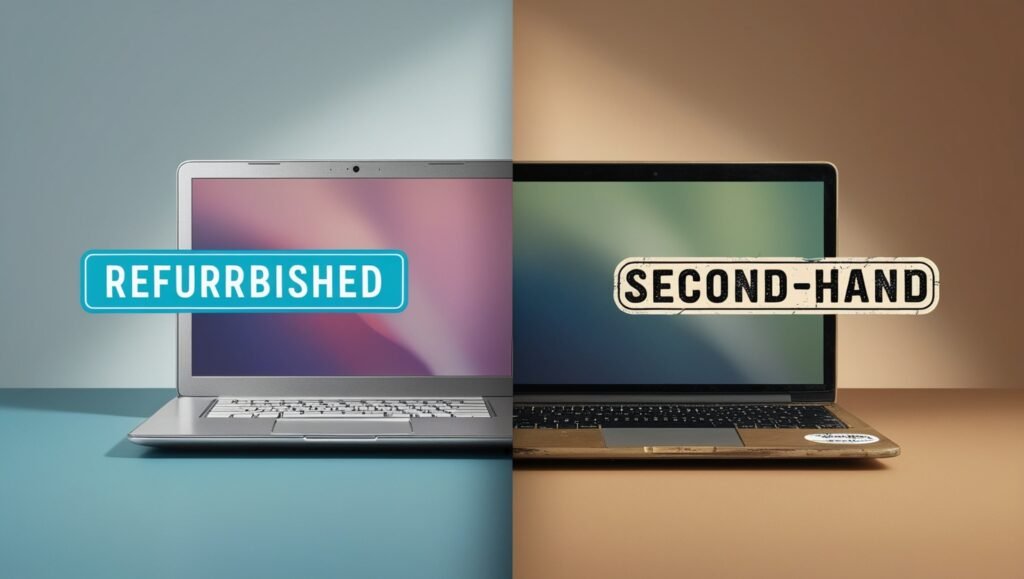When it comes to buying a laptop on a budget, two common options are refurbished v/s second-hand laptops. At first glance, these terms may seem interchangeable, but there are key differences between the two that can greatly affect your purchase. Understanding the distinctions can help you make an informed decision that balances cost, performance, and reliability.
In this article, we’ll break down the differences between refurbished and second-hand laptops, explore the benefits of each option, and discuss why a certified refurbished laptop might be the best choice for many buyers.
1. What Is a Refurbished Laptop?
A refurbished laptop is a pre-owned device that has been returned, tested, repaired (if necessary), and restored to full working condition. These laptops often come from customer returns, lease expirations, or overstocked products. They undergo a rigorous inspection process to ensure they meet factory standards before being resold, often at a discounted price.
The Process of Refurbishment
Refurbishment involves multiple steps, such as:
- Thorough Testing: Refurbished laptops are tested to ensure they function as intended, from the hardware to the software. Any issues that arise during testing are repaired.
- Replacement of Parts: If any parts are damaged or worn out, they are replaced with new or certified parts.
- Cleaning and Cosmetic Touch-ups: The laptop is cleaned inside and out, and any cosmetic imperfections (like scratches or dents) are fixed to improve its appearance.
- Software Updates and Wipes: The operating system is reinstalled or updated, and all previous data is wiped clean, giving the laptop a fresh start.
- Certification and Warranty: Many refurbished laptops, especially certified refurbished models, come with a warranty and certification from the manufacturer or authorized refurbisher. This guarantees that the device meets specific quality standards.
2. What Is a Second-Hand Laptop?
A second-hand laptop, on the other hand, is a pre-owned device sold as-is by the previous owner. These laptops may not have undergone any formal refurbishment or repairs, and they typically do not come with warranties or guarantees. Buying second-hand laptops often involves purchasing from individual sellers through online marketplaces, classified ads, or local shops.
Characteristics of Second-Hand Laptops
- No Professional Inspection: Unlike refurbished laptops, second-hand laptops have not undergone professional testing or repairs. This means you’re relying solely on the previous owner’s word about the laptop’s condition.
- Varied Conditions: The condition of second-hand laptops can vary significantly. Some may be in near-perfect condition, while others might have internal or external damage that the seller doesn’t disclose.
- Lower Price: Second-hand laptops are generally cheaper than refurbished laptops because they do not go through the refurbishment process. However, this lower price comes with higher risk, as there’s no guarantee of the laptop’s performance or longevity.
3. Certified Refurbished Laptops: A Safer Option
One of the key advantages of buying refurbished laptops is the availability of certified refurbished options. These laptops are refurbished by the original manufacturer or a third-party company that follows strict refurbishment guidelines. Certified refurbished laptops typically include a warranty and meet high-quality standards, making them a more reliable option compared to second-hand devices.
Benefits of Certified Refurbished Laptops:
- High Quality Standards: Certified refurbished laptops must pass a series of tests to ensure they perform like new. This includes checks on hardware components like the processor, hard drive, and RAM, as well as the software.
- Warranty: Most certified refurbished laptops come with a warranty, usually ranging from 90 days to a full year. This provides peace of mind that the device will be repaired or replaced if it malfunctions during the warranty period.
- Brand Assurance: Buying directly from manufacturers like Apple, Dell, or HP, or from authorized refurbishers, ensures that the laptop has been properly tested and restored to factory standards. These brands have reputations to uphold, so they’re unlikely to sell subpar products under the “certified refurbished” label.
4. Key Differences Between Refurbished and Second-Hand Laptops
To better understand which option might suit your needs, it’s important to compare the core differences between refurbished laptops and second-hand laptops across several categories:
| Category | Refurbished Laptops | Second-Hand Laptops |
| Condition | Restored to like-new or good condition | Varies depending on previous owner’s use |
| Testing | Undergoes thorough professional testing | No professional testing; relies on seller’s word |
| Repairs | Necessary repairs and replacements made | Sold as-is; no repairs guaranteed |
| Warranty | Usually includes a warranty (90 days to 1 year) | No warranty or guarantees |
| Price | Higher price due to refurbishment process | Generally cheaper but with higher risk |
| Source | Sold by manufacturers or authorized refurbishes | Typically sold by individuals or local shops |
5. Pros and Cons of Refurbished Laptops
Pros:
- Reliability: Refurbished laptops are tested and repaired, making them more reliable than second-hand devices.
- Warranty: Many refurbished laptops come with a warranty, reducing the risk of purchasing a faulty product.
- Cost Savings: While refurbished laptops are more expensive than second-hand options, they still offer significant savings compared to new laptops.
Cons:
- Limited Availability: Not all laptop models may be available as refurbished options.
- Slightly Higher Price: Compared to second-hand laptops, refurbished laptops can be slightly more expensive, but they still provide excellent value for the money considering the quality and warranty.
6. Pros and Cons of Second-Hand Laptops
Pros:
- Lower Cost: Second-hand laptops are generally cheaper because they don’t go through the refurbishment process.
- Greater Availability: There are more second-hand options available from individual sellers and online platforms.
Cons:
- No Warranty: Second-hand laptops typically come with no warranty or guarantee, increasing the risk for the buyer.
- Unknown Condition: Without professional testing, it’s difficult to know the true condition of the laptop. Issues like battery life, software malfunctions, or internal damage may not be immediately apparent.
- Shorter Lifespan: Because second-hand laptops have already been used, their remaining lifespan may be shorter than that of refurbished models.
7. When Should You Buy a Refurbished Laptop?
If you’re looking for a balance between affordability and reliability, a refurbished laptop is a smart choice. These laptops are ideal for:
- Budget-Conscious Buyers: If you want a laptop that functions like new but costs less than a brand-new model, a refurbished laptop is a great option.
- Professionals and Students: Whether you need a laptop for work or study, buying refurbished ensures you get a dependable device with a warranty, reducing the risk of unexpected repairs.
- Sustainability-Minded Shoppers: Buying a refurbished laptop is also an eco-friendly choice, as it extends the life of a pre-owned device and reduces e-waste.
8. When Should You Buy a Second-Hand Laptop?
Second-hand laptops might be a good option in specific scenarios, such as:
- Short-Term Use: If you only need a laptop for a short period and don’t want to spend much, a second-hand laptop can be an affordable, temporary solution.
- Experienced Buyers: If you have the technical know-how to evaluate a laptop’s condition and are comfortable taking on the risk of potential repairs, buying second-hand could save you money.
However, for those who need reliability and long-term use, the lack of warranty and potential unknown issues make second-hand laptops a riskier option.
Conclusion: Which Is the Right Choice for You?
When deciding between a refurbished laptop and a second-hand laptop, it’s important to consider your priorities. If you value reliability, performance, and peace of mind, a certified refurbished laptop is likely your best bet. It offers the assurance of professional testing, necessary repairs, and a warranty that covers potential issues.
On the other hand, if you’re focused solely on saving money and are willing to accept the risks associated with buying a device without professional inspection or a warranty, a second-hand laptop may suit your needs.
Ultimately, choosing between these two options depends on your budget, technical needs, and risk tolerance.




